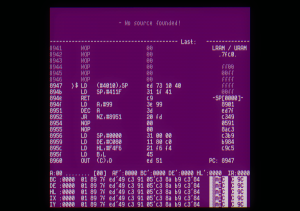Wow… what a great game development competition – again! And the best of all: I was allowed to be in the jury which was a great honor for me. But let’s talk about the games… I guess that this competition has rised the bar of the quality of the entries again and the students used ASM instead of C. Finally the games Operation Alexandria by 4MHz (1st), Jarlac by Retrobytes Productions (2nd) and Legend of Steel by TOD Studios (3rd) won the competition. And they really, really, really deserve it, but download them (download link below) and you can see it by yourself.
My personal 2nd place (I had to vote for the playability), the game Taulellets by Vicente Jimenez, was finally ranked 17 – anyway, I still like it very much and I will play it from time to time for sure. It made me come back during the test of the other games to play a short round to get past the next level :-).
If you want to participate on the CPCRetroDev next year, be sure to download the games and have a look at the documentations in the games folder. All the developers wrote a small “Making Of” and all games contain the source code. So this is obviously a great learning resource for everyone who wants to code for the Amstrad CPC.
But enough from me… here are the results of the CPCRetroDev 2018 game development competition:
| Position | Image | Game | Group | Result |
|---|---|---|---|---|
| 1 |  | Operation Alexandra | 4MHz | (393) Best Game, Carlos Abril Mention, Gominolas Mention, Relevo Mention |
| 2 |  | Jarlac | Retrobytes Productions | (380) 2nd Best Game, Pablo Ariza Mention |
| 3 |  | Legend of Steel | TOD Studios | (283) 3rd Best Game |
| 4 |  | The Adventures of Timothy Gunn | CNGSoft | (278) 4th Best Game |
| 5 |  | OPQA vs. QAOP: The Final Battle | Manuel Sagra | (261) |
| 6 |  | 77 Attempts | Unknown Design | (202) Best Student Game |
| 7 |  | Foosball F3 | Quique Miquel | (180) |
| 8 |  | Deeper Warrens | Arnoud Bouche | (162) |
| 9 |  | The Rookie Thief | CPZenon Games | (145) 2nd Best Student Game |
| 10 |  | Crimson Knight Adventures | Nibble Games | (134) |
| 11 |  | Harvest Day | Pixel Productions | (129) |
| 12 |  | Redsea | Gameroid | (114) |
| 13 |  | Earth Defender | Carlos Perezgrin | (113) Best Opera Prima Additional Mention |
| 14 |  | Snake Bubble | The Bubble Club | (106) |
| 15 |  | The Last Debt | Retrojam Games | (105) |
| 16 |  | KimoHiyoko | SarayCow | (103) |
| 17 |  | Taulellets | Vicente Jimenez | (99) |
| 18 |  | The Spirit Of Halloween | Lab16Devs | (98) |
| 19 |  | The Crypt | RetroGamma | (97) |
| 20 |  | Cannon Duels | David Asta | (96) |
| 21 |  | Space Cowboy | VoxelTower | (94) |
| 22 |  | Indigo | Indigo | (87) |
| 23 |  | BringRGBack | Dead Pixel | (74) |
| 24 |  | Overheap | BastaCPC | (70) |
| 25 |  | Turtle Slam | TurtleSlam | (68) |
| 26 |  | Space Ball | Altered Vision | (67) |
| 27 |  | Elfo Saves Christmas | Ninja Pointer | (66) |
| 28 |  | Two Finger Death Now | Spherp08 | (62) |
| 29 |  | Cat Pang | Lady Cats | (61) |
| 30 |  | Cuchara Voladora | CucharaVoladora | (60) |
| 31 |  | Fitzroy And The Infestation | awergh | (60) |
| 32 |  | Bank | ACReturns | (53) |
| 33 |  | Hacktank | Retroleto Games | (50) |
| 34 |  | Lunatic | Lunatic | (45) |
| 35 |  | Invade Space | Proyecto Red | (41) |
| 36 |  | Tank | ARDAD | (41) |
| 37 |  | Disassembler | Machine Gun | (40) |
| 38 |  | Killing Machine | PizzarT | (40) |
| 39 |  | Penalty Kicks | Sakis Kaffesakis | (40) |
| 40 |  | Crocker | Merienda | (20) |
| 41 |  | 18th Century Invaders | LYSGames | (3) |
You can download the games in one package directly down below or from the download section of this site. More information about the game development competition can be found on the CPCRetroDev homepage.


